By Md. Ali, TwoCircles.net,
New Delhi: If you think that only communal conflict and strife are the defining features of Ayodhya-Faizabad then you are mistaken. There is one person who has changed this stereotype about the “Baghe Eram (garden of love)” as a poet famously called the twin towns.
Meet Mohammad Shareef, a resident of Mohalla Khidki Ali Begh in Faizabad who has been performing the last rites of unclaimed dead bodies selflessly since last 18 years without fail.
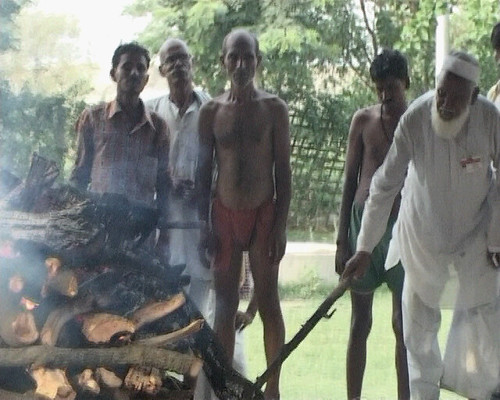
Md. Shareef lighting the funeral pyre
Md. Shareef, who till now has performed last rites of about 1600 unclaimed bodies, has emerged as the “torch bearer” of secularism and communal harmony who has only strengthened the plural fabric of Ganga-Jamuni tehzeeb (the syncretic and plural culture originating on the banks of Ganges-Yamuna), a culture which has been much wounded by the communal onslaughts over Babri dispute.
Compassion embodied
The Buddhist priest in Faizabad, Dr. Karuna Sheel says, “Main Shareef Chacha ko Quran ki un Ayato per khara uterta hua pata hun, jahan Insaniyat ki baat kahee gayee hai, (I find Shareef Chacha living in the spirit of all those verses of the Holy Quraan which talk about Humanity)”
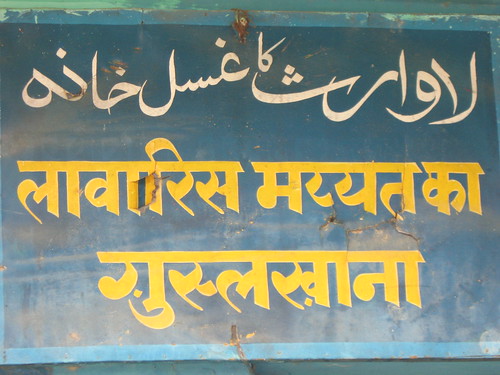
“Epitome of compassion,” this is how the priest of Ramjanambhoomi, Satyendra Das calls Shareef Chacha.
A typical day for Shareef Chacha starts with a visit to the local mortuary, hospital, railway tracks and every place where he can locate any unclaimed body.
If he finds any unclaimed dead body then he himself gives it a bath and makes all the arrangement necessary as per the faith of the dead.
A Muslim lighting funeral pyre
What best a sight can be than that of a cap clad Muslim cremating his brother of another faith. You may have never seen this but this happens in Faizabad and people appreciate this as a symbol of compassion, secularism and humanity.
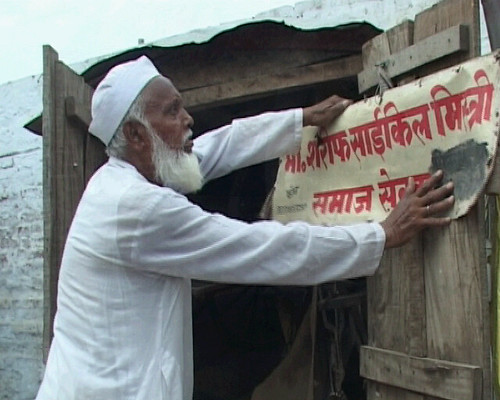
Shareef Chacha as a bycycle mechanic
And if the dead body is that of a Muslim then Md. Shareef digs the grave himself because he can’t afford to pay the grave digger.
It all started when his son Md. Raees was killed in 1992 and his body was found packed in a bag many days later in Sultanpur. That day Shareef Chacha told himself that “till my life no unclaimed dead body will be a waste in hospital or any where else.”
No financial help
What is heart wrenching is that this cycle mechanic cum social worker doesn’t mind if the unclaimed dead bodies don’t leave him with sufficient time to earn and run the small cycle shop.
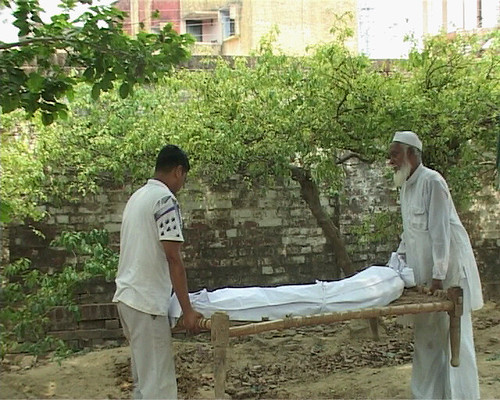
Preparing for the final journey
Md. Shareef who has turned into an “institution” does all the selfless work without any big financial help from any body; so much so that he had to sell his land as he didn’t have any money to do the social work.
He suffers from heart related diseases and problems typical of old age but that doesn’t stop him from his work.
It is not only the last rites of unclaimed bodies that he performs. He is also a social worker who is ready to help any body and every body who doesn’t have any one to depend on. He also goes to hospital and looks after and feeds the unattended poor patients.
Worried, who will carry on his legacy after him?
He is also very concerned about who will carry on his legacy after his death as he has turned very frail now.
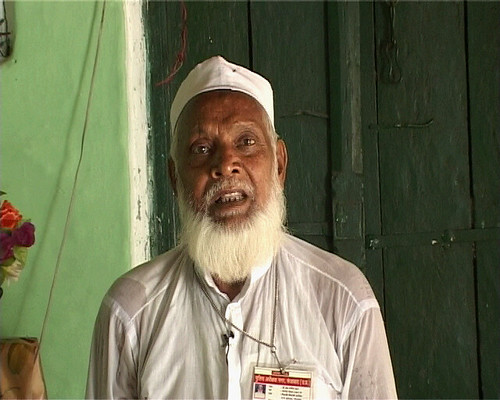
Mohammad Shareef
Not to mention that his family members quite often stop him from social work but Md. Shareef simply doesn’t stop.
Unsung Hero
The general public in Faizabad is reportedly angry at the fact that why the works of Shareef Chacha can’t be recognized by the Government. Who else deserves Padma award they ask.
Md. Shareef’s contribution to the secular and plural ethos of our society is the topic of “Rising from the ashes”, a documentary made on him by a group of journalists which includes Syed Ali Akhtar, Shah Alam, Ghufran Khan and Shariq Haider Naqvi.
Talking about the purpose of making this documentary, Syed Ali Akhtar, the director of “Rising from the Ashes” and student of Mass Communication Research Center, Jamia Millia Islamia says,“ we wanted to highlight the works of Shareef Chacha and thereby to break the stereotype of ‘Faizabad-Ayodhya” as twin cities seen as the core of the communal conflicts in India.”
Akhtar highlights the fact that they didn’t have money to take up this documentary so they wrote a letter to every NGO working particularly in the area of communal harmony and secularism, asking for the bare minimum amount of money for the expenses of this project.
But no one came forward so some how this young and enthusiastic group of journalists managed the money on its own and produced this homage to this unsung “torch bearer of humanity” of Faizabad.
The screening of this 17 minutes documentary will be done tomorrow 3 pm 9th of November at K R Narayanan Center for Dalit Studies, Jamia Millia Islamia, New Delhi.
Any body interested in the screening of this 17-minute-long documentary can contact Ali Akhtar at 09871511120 and [email protected]
Photo courtesy- producers of “Rising from the Ashes”

